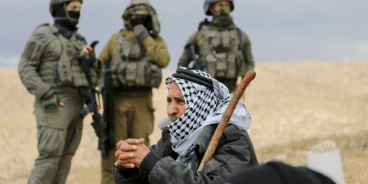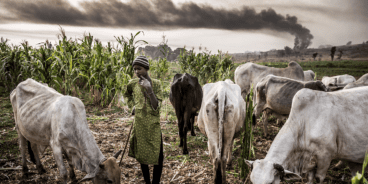
Open Letter to Member States of the United Nations Marking the Fifth Anniversary of the Adoption of the Responsibility to Protect
Five years ago world leaders gathered in New York and unanimously committed to protect populations from the most conscience-shocking atrocity crimes: genocide, war crimes, ethnic cleansing and crimes against humanity. Now we mark the fifth anniversary of the historic pledge that they made to the responsibility to protect (R2P). We also acknowledge the magnitude of the challenge that lies ahead if the horrors of Rwanda, Srebrenica and Cambodia are not to be repeated in Kyrgyzstan, the Democratic Republic of Congo (DRC), and Sudan.
The world has too often failed to protect the most vulnerable from mass atrocities. We are heartened to see that the commitment to atrocity prevention endures, and that clarity within the UN is being achieved about how to prevent genocide and other mass atrocities. The 2009 formal debate in the General Assembly on Implementing the Responsibility to Protect; the adoption by consensus of the first General Assembly resolution on R2P; and the recent informal dialogue on R2P and early warning and assessment, all testify to this. Equally significant has been the Security Council’s re-affirmation of the norm – in two thematic resolutions and one resolution on Sudan – in expressing the political commitment to prevent and halt mass atrocities.
Swift international responses to halt unfolding atrocities in Kenya in 2008 and their recurrence in Guinea in 2010 offer vivid examples of what R2P means in practice. Furthermore, they illustrate how non-coercive measures – not merely military intervention – can be used in a timely and decisive manner to save lives. Advances in early warning capacities at the regional and international level, and ongoing changes within the UN – notably the Secretary General’s proposal to institutionalize the collaboration between the Special Adviser for the Prevention of Genocide and the Special Adviser on the conceptual, political and institutional development of the R2P – have all contributed to improving international and regional capacities to prevent and protect.
Yet giving full life to the responsibility to protect requires much more than this. As you read this, people are suffering atrocity acts that might well have been preventable. In the DRC sexual violence remains widespread. As you know from the recent widely reported cases, episodes of rapes have been occurring close to UN peacekeepers with little if anything being done to prevent or offer protection. In Kyrgyzstan, forthcoming elections could trigger a new outbreak of attacks that might result in international crimes, yet there appears to be no clear strategy in place on how to avert them.
We know that Sudan rests on a precipice with the potential for large-scale atrocities to recur. Violence has been rising in Darfur and the upcoming January 2011 referendum in the South is a potential tipping point. Experts have warned that populations in Abyei, Southern Kordofan, Blue Nile, as well as South Sudanese in the North, and those along the border are particularly at risk, and have reminded the UN and its member states of their responsibilities.
As heads of state and government gather once again in New York to debate and agree on action to address the greatest challenges facing human kind, the R2P should be right at the top of the lists of concerns. In particular, we urge those involved in addressing the situation in Sudan to seize this opportunity to remind all relevant actors of the weight of the 2005 pledge to the R2P.
With all good wishes for a successful opening session.
Sincerely,
- Roméo Dallaire, Served as the force commander of the UN mission to Rwanda, Canadian Senator, patron of the Global Centre for the Responsibility to Protect.
- David Hamburg, Former President of the Carnegie Corporation of New York and patron of the Global Centre for the Responsibility to Protect.
- Prince El Hassan bin Talal, Board member of the Nuclear Threat Initiative (NTI), Commissioner on Legal Empowerment for the Poor and patron of the Global Centre for the Responsibility to Protect.
- Gareth Evans, Co-Chair, International Commission on Nuclear Non-Proliferation and Disarmament, President Emeritus, International Crisis Group, former Australian Foreign Minister, and co-chair of the International Advisory Board of the Global Centre for the Responsibility to Protect
- Mohamed Sahnoun, Former UN Secretary-General’s Special Adviser, and co-chair of the International Advisory Board of the Global Centre for the Responsibility to Protect
- Jan Egeland, Director, Norwegian Institute of International Affairs, former UN Under-Secretary-General for Humanitarian Affairs and Emergency Relief Coordinator, and member of the International Advisory Board, Global Centre for the Responsibility to Protect
- Thelma Ekiyor, Executive Director, TY Danjuma Foundation, and member of the International Advisory Board, Global Centre for the Responsibility to Protect
- Rosemary Foot, Professor of International Relations and Swire Senior Research Fellow, Oxford University, and member of the International Advisory Board, Global Centre for the Responsibility to Protect
- Carolina G. Hernandez, Professor Emeritus of Political Science at the University of the Philippines, Founding President and Chair of the Board of the Institute for Strategic and Development Studies, and member of the International Advisory Board, Global Centre for the Responsibility to Protect
- Ricardo Lagos Escobar, President of the Republic of Chile between 2000 and 2006, UN Special Envoy for Climate Change, and member of the International Advisory Board, Global Centre for the Responsibility to Protect
- Frank Majoor, Former Permanent Representative of the Netherlands to the UN, current Permanent Representative of the Netherlands to NATO, and member of the International Advisory Board, Global Centre for the Responsibility to Protect
- Juan Méndez, Former UN Secretary-General’s Special Adviser on the Prevention of Genocide, and member of the International Advisory Board, Global Centre for the Responsibility to Protect
- Edward Mortimer, Senior Vice-President and Chief Program Officer, Salzburg Global Seminar, chief speechwriter and director of communications to UN Secretary-General Kofi Annan, and member of the International Advisory Board, Global Centre for the Responsibility to Protect
- Mónica Serrano, Executive Director, Global Centre for the Responsibility to Protect
- Ramesh Thakur, Professor of Political Science at the University of Waterloo, and former Senior Vice-Rector of the UN, and member of the International Advisory Board, Global Centre for the Responsibility to Protect
- Thomas G. Weiss, Presidential Professor of Political Science, CUNY Graduate Center, Director, Ralph Bunche Institute for International Studies, and member of the International Advisory Board, Global Centre for the Responsibility to Protect
Related Content


Atrocity Alert No. 445: Sudan, Syria and Eritrea
